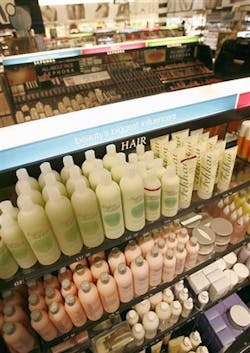Duty-Free Operators Fear Widespread Slump
Whiskeys, Champagnes and perfumes used to be regarded as a satisfying perk of air travel: Hit the airport duty-free shop and get an expensive bottle of Chanel No. 5 or Veuve Cliquot tax-free.
The United States now regards these as potential tools of terrorism, and the multibillion-dollar duty-free industry, which was enjoying a solid recovery after a slump following the terrorist attacks of Sept. 11, 2001, is girding for a hit.
The United States and Britain banned liquids from being carried in passenger cabins after the authorities announced Thursday a terrorist plot to down airliners using liquid explosives.
So far, the ban applies to flights leaving and entering the United States. But the industry is nervously eyeing the possibility that other countries could embrace the restrictions.
On Friday, British Airways announced an indefinite suspension of all of its in-flight duty-free sales, which comprise not only liquor and perfumes but also handbags, cigarettes, toys and other items.
BA said the step would free up space for the planes to carry water, which passengers can no longer take through security, and prevent people from buying a banned item on one leg of a flight and taking it on a connection to the United States.
Duty-free operators fear the current rules may be a prelude to more. Now that a documented terrorist plot to use liquids as explosives has been uncovered, the authorities around the world may find themselves tempted to follow the American lead, said Yngve Bia, chief executive of Generation Group, a duty-free consultancy.
''This issue is now on the politicians' agenda,'' Bia said. ''And everybody is going to look at each other to figure out what they should do.''
Sales of alcoholic beverages at airports and in airliners comprised about 18 percent of the global duty-free market, according to Generation Group, a Swedish consultancy, with sales of wines and spirits totaling $2 billion in 2005.
Though still a hefty sum, alcohol's importance for duty-free sales has dropped by half over the past 20 years as retailers added other high-value products, like travel goods, watches and sunglasses. For instance, sales of cosmetics and fragrances totaled $5 billion last year
But the new restrictions still rankled the industry.
''If people cannot take their purchases on board, this may pose the most serious economic problem,'' said Jean-Claude Baumgarten, president of the World Travel and Tourism Council. ''Duty-free sales are increasingly part of the profitability of airports.''
Sales staff at airports across the globe were checking tickets to ensure that duty-free stores were not selling liquid items to U.S.-bound flyers.
At Charles de Gaulle Airport in Paris, duty free is big business, with 70 boutiques selling luxury items. An airport spokesman, who declined to be identified, said the bulk of sales were alcohol, perfume and tobacco.
''We don't have the right to sell to them, and they don't have the right to buy,'' Muyeto Choisy, a sales clerk at the airport shop Beauty Unlimited, said. She said that the store had been told not to sell liquids, creams or perfumes to any passengers bound not only for the United States but also for Britain and Israel.
The store has an average of 10,000 clients per day, many of them flying to the United States, she said. By midafternoon, the store manager said the shop had seen less than half it normal number of clients.
Still, airport retailers were hesitant to pronounce major losses for their industry after such a short period of restrictions.
''Duty free has existed for a long time, perhaps there will have to be changes in the system,'' said Pascal Merle, a director at Aelia, the largest French distributor of duty-free goods, with 110 outlets in France, mostly in Paris. ''We'll need another week or so to have a better insight.''
Gebr. Heinemann, a Hamburg-based company that holds the duty-free concession at Frankfurt's airport, said the effects on sales at its airports in Germany, Turkey and South Africa had been limited but noticeable.
Only about 13 percent of the passengers passing through Frankfurt are headed for the United States, so the effects are limited.
Copyright 2005 LexisNexis, a division of Reed Elsevier Inc. All rights reserved.
Terms and Conditions | Privacy Policy
News stories provided by third parties are not edited by "Site Publication" staff. For suggestions and comments, please click the Contact link at the bottom of this page.

